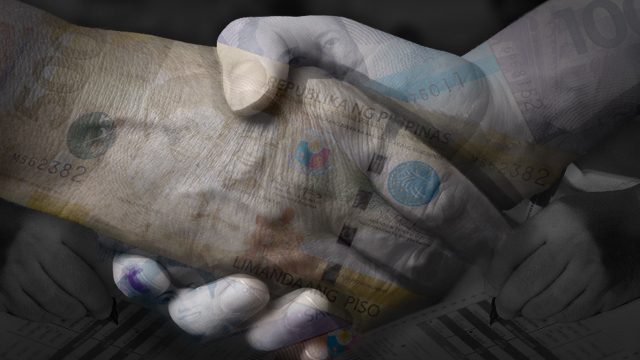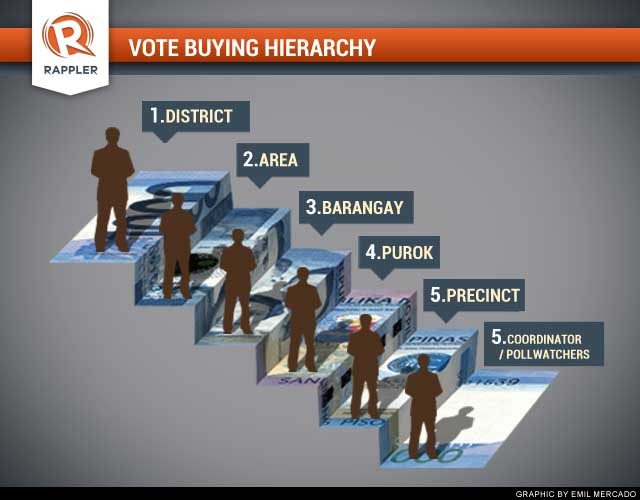SUMMARY
This is AI generated summarization, which may have errors. For context, always refer to the full article.

MANILA, Philippines – All secrets are eventually revealed. Or are they?
In the Philippines, vote-buying and vote-selling have been part of every election. This, despite laws restricting it.
Vote-buying is an open secret among several communities, yet it is among the hardest election offenses to prove.
Although it comes in different forms, vote-buying in the Philippines has been rather consistent in terms of methods. Here are some observable patterns:
- It is systematic. The candidates themselves do not do the actual vote buying. Instead they have coordinators working in the barangay and purok levels who do the dirty work for them.
- No amount is ever too small or too big. In a documented case in Cagayan de Oro, vote-buying goes for as low as P1,000 per head. Meanwhile, in Samar, one of the country’s poorest provinces, rates could go as high as P5,000 to P7,000.
- It happened even after poll automation. One might think that the country’s transition to an automated election would eliminate vote-buying. The truth, however, is far from that. Since the 2010 poll automation, incidences of vote buying have actually increased, the Comelec observed.
Secrets
How does vote-buying work?
“Hindi lantaran (Not openly),” said Fr Leonardo Tan of the poll watchdog Parish Pastoral Council for Responsible Voting (PPCRV).
The PPCRV observed the following modus operandi across provinces:
- Candidates hire people to do the vote-buying for them. They are called “leaders.”
- Leaders have their respective turfs (i.e., barangays, streets) where they conduct surveys to see if voters support their candidate. If not, prices of votes go up.
- Leaders recruit families, in which parents act as “sub-leaders.” They recruit their children of voting age. Block voting happens within the family.
- Each family member receives around P500 to P5,000, but rates vary.
- Leaders also connive with some election officers.

“Some families go for whoever is the highest bidder,” said Tan.
Just imagine how much candidates fork out to win. “That’s where corruption comes in because they have to get back what they spent,” Tan added.
How do leaders verify if their recruits actually voted for the candidate?
After the election, they make a tally: How many households in the area accepted money and how many voters actually voted for the candidate. If there’s a mismatch, threats are made, including less political favors, or cutting off water or electricity.
The system works similarly to a networking scheme, where the “leaders” get the biggest slice of the cake.
Before polls were automated, another way to verify votes was to place carbon paper under ballots. The voters had to bring these copies to the leaders to get paid.
Money transactions usually happen one or two weeks before the election or on the day itself. Prior to that, other forms of vote-buying include:
- Giving away of rice, groceries, gadgets, or other things of value.
- Providing or promising jobs (short-term contracts lasting from 15 to 30 days), promotions, scholarships, infrastructure projects in exchange for votes.
“If I win, I will build a water system and roads. If I don’t win, none,” said Tan, describing candidates’ promises.
Aside from bribing people to vote for a certain candidate, they may also be paid to not vote at all. Another method is to have ballots “pre-marked,” rendering them invalid.
Creative, sly
//
As election nears, the Comelec and election poll watchdogs are encouraging Filipinos to remain vigilant. Guard your…
Posted by Rappler on Tuesday, March 29, 2016
In Siquijor, locals always look forward to May not only because of at least 3 fiestas they celebrate and host, but also because of money. (WATCH: Votes for sale)
Some of them come home to sell their votes, claimed Tan.
Such scenario is not unique to Siquijor, but seen elsewhere in the Philippines.
Meanwhile, in Dumaguete vote-buying occurs at night. This is dubbed as kamang, which translates to “crawling” in English.
“Pupunta ‘yan sa bahay isa-isa, maniningil mga pulitiko. ‘Di ba ako nagpaaral sa nanay n’yo? Bayad-utang (They go to houses one by one, asking for dues, saying ‘Didn’t I pay for your mother’s studies? Pay your debt’),” Julius Heruela, PPCRV-Dumaguete coordinator, said.
By morning, money is distributed among precincts.
In the 2013 election, people submitted to PPCRV-Dumaguete the money they received. The money was stapled on sample ballots.
Some candidates plant fear among voters, Heruala added. Candidates may tell voters their business permits would not be renewed if they lose.
“Because of the voters’ fear, the candidate wins,” said Heruela. “People are scared because they are fooled into thinking that the candidate will know who they voted for.”
As a result, individuals develop an “unconscious effort” to campaign for the candidate as well, Alvia added. Some would even coerce others, such as subordinates, to vote for their pick.
This is where voter’s education comes in, advocates said.
“Campaign against vote-buying should start early,” said Tan, urging parents to also teach their children. “The money you enjoy for a day but for the next 3 or 6 years, you will suffer.”
Some vote buyers, however, are less sly in hiding vote-buying. (WATCH: Alleged vote buying in Ilocos)
Everywhere
Vote-buying, the PPCRV said, is practiced by candidates seeking both national and local posts. They observed that families from brackets D and E are mostly the ones selling votes.
But such is not always the case.
“Vote-selling is not only a domain of the lower income class,” argued Eric Alvia of the National Citizens’ Movement for Free Elections (Namfrel).
Vote-buying, Namfrel stressed, also happens among religious groups or sects, socio-civic organizations, businesses, and interest groups who are after concessions and license agreements.
With the introduction of technology, modes of payment have also changed, said Alvia. This includes cellphone loads, mobile money transfers, and gift checks.
“As long as there’s poverty, it’s hard to remove vote-buying,” said PPCRV founder Henrietta De Villa.
Teeth
Vote-buying hot spots are mostly those with political clans and warring groups equipped with private armies, Alvia observed. But vote-buying could still happen anywere.
Under the Omnibus Election Code, vote-buying and vote-selling are election offenses. Violators may be imprisoned for 1 to 6 years and disqualified from holding public office.
The problem, however, lies in the absence of teeth in our laws, poll watchdogs lament. The event is so rampant that many Filipinos have become indifferent to it, advocates say.
If there is anyone apprehended, the “big fish” still gets away, said De Villa. She said candidates should “return the honor in campaigning.”
“Even the people who are supposed to impose the law tolerate it or are involved,” Alvia added.
“What we need is action beyond reporting,” said Alvia, urging the police and the National Bureau of Investigation to carry out operations that will bust the twin evils of vote-buying and vote-selling. – Rappler.com
Part 2: Comelec urges public to report vote-buying
Know of any election-related wrongdoings? Use the #PHVoteWatch map to report vote buying and vote selling, campaign finance anomalies, election-related violence, campaign violations, technical glitches, and other problems observed among communities.
Together, let’s each find #TheLeaderIWant and agree on who we want. To volunteer for any of these efforts, email us through move.ph@rappler.com.
Handshake photo from Shutterstock
Add a comment
How does this make you feel?
There are no comments yet. Add your comment to start the conversation.